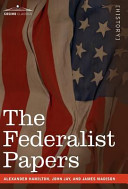TODO: Quote from the Federalist Papers
A man must be far gone in Utopian speculations who can seriously doubt that, if these States should either be wholly disunited, or only united in partial confederacies, the subdivisions into which they might be thrown would have frequent and violent contests with each other. To presume a want of motives for such contests as an argument against their existence, would be to forget that men are ambitious, vindictive and rapacious. To look for a continuation of harmony between a number of independent, unconnected sovereignties in the same neighbourhood, would be to disregard the uniform course of human events, and to set at defiance the accumulated experience of ages.
The causes of hostility among nations are innumerable. There are some which have a general and almost constant operation upon the collective bodies of society. Of this description are the love of power or the desire of preeminence and domination—the jealousy of power, or the desire of equality and safety. There are others which have a more circumscribed though an equally operative influence within their spheres. Such are the rivalships and competitions of commerce between commercial nations. And there are others, not less numerous than either of the former, which take their origin entirely in private passions; in the attachments, enmities, interests, hopes and fears of leading individuals in the communities of which they are members. Men of this class, whether the favorites of a king or of a people, have in too many instances abused the confidence they possessed; and assuming the pretext of some public motive, have not scrupled to sacrifice the national tranquillity to personal advantage or personal gratification. . . .
Have republics in practice been less addicted to war than monarchies? Are not the former administered by men as well as the latter? Are there not aversions, predilections, rivalships, and desires of unjust acquisitions, that affect nations as well as kings? Are not popular assemblies frequently {205} subject to the impulses of rage, resentment, jealousy, avarice, and of other irregular and violent propensities? Is it not well known that their determinations are often governed by a few individuals in whom they place confidence, and are, of course, liable to be tinctured by the passions and views of those individuals? Has commerce hitherto done anything more than change the object of war? Is not the love of wealth as domineering and enterprising a passion as that of power or glory? Have there not been as many wars founded upon commercial motives since that has become the prevailing system of nations, as were before occasioned by the cupidity of territory or dominion? Has not the spirit of commerce, in many instances, administered new incentives to the appetite, both for the one and for the other? Let experience, the least fallible guide of human opinions, be appealed to for an answer to these inquiries. . . .
Is it not time to awake from the deceitful dream of a golden age, and to adopt as a practical maxim for the direction of our political conduct that we, as well as the other inhabitants of the globe, are yet remote from the happy empire of perfect wisdom and perfect virtue?
Notes:
The Federalist Papers, though written in haste and in the context of a local political battle, gave a lasting intellectual legitimacy to the idea of federal government. They still speak to mankind today with undiminished force, warning us {204} of the disasters to which the competition of local sovereignties can lead us.
Folksonomies: todo
Taxonomies:
/society/unrest and war (0.455155)
/law, govt and politics (0.434053)
/society (0.352694)
Keywords:
lasting intellectual legitimacy (0.974066 (negative:-0.261021)), Federalist Papers (0.963614 (neutral:0.000000)), local political battle (0.959203 (negative:-0.203554)), equally operative influence (0.927464 (neutral:0.000000)), Papers The Federalist (0.817592 (neutral:0.000000)), undiminished force (0.815081 (positive:0.370878)), Utopian speculations (0.806404 (negative:-0.475540)), violent contests (0.801523 (negative:-0.533785)), federal government (0.797981 (negative:-0.261021)), unconnected sovereignties (0.794238 (negative:-0.351787)), local sovereignties (0.791501 (negative:-0.486377)), partial confederacies (0.788488 (negative:-0.216739)), violent propensities (0.787691 (negative:-0.640317)), private passions (0.784606 (neutral:0.000000)), personal gratification (0.782115 (positive:0.463362)), fallible guide (0.781737 (neutral:0.000000)), national tranquillity (0.781272 (positive:0.463362)), human events (0.778600 (neutral:0.000000)), commerce hitherto (0.778258 (negative:-0.366816)), constant operation (0.777705 (neutral:0.000000)), commercial nations (0.776457 (neutral:0.000000)), public motive (0.775108 (neutral:0.000000)), uniform course (0.774781 (neutral:0.000000)), deceitful dream (0.774381 (neutral:0.000000)), unjust acquisitions (0.773352 (negative:-0.349385)), commercial motives (0.772131 (negative:-0.282820)), collective bodies (0.766790 (neutral:0.000000)), practical maxim (0.764167 (positive:0.617224)), personal advantage (0.764133 (positive:0.463362)), human opinions (0.761972 (neutral:0.000000))
Concepts:
Federalist Papers (0.937564): dbpedia | freebase | yago
Alexander Hamilton (0.764014): yago | dbpedia | freebase | opencyc
Anti-Federalist Papers (0.727027): dbpedia | freebase | yago
James Madison (0.685187): freebase | dbpedia | website | opencyc | yago
War (0.666689): dbpedia | freebase | opencyc





